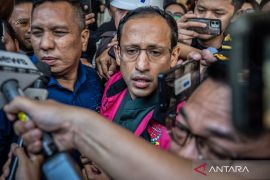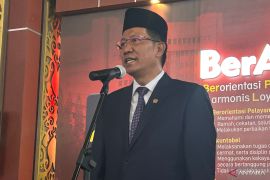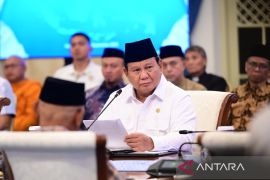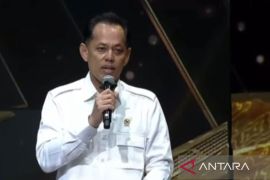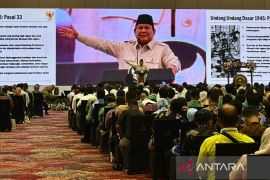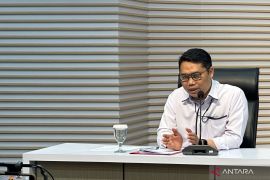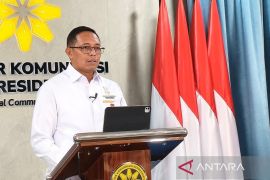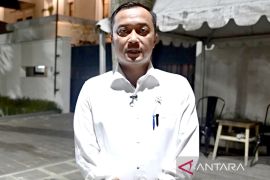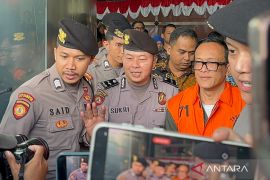Therefore it has decided to raise civil servants salaries across the board as a preventive strategy against graft and corruption, President Susilo Bambang Yudhoyono said in his keynote address at the conference on "Shaping a New World: Combating Foreign Bribery in International Business Transactions" at Nusa Dua resort in Bali on Tuesday.
One strategy, according to the head of state, was to morally distinguish between corruption carried out by high-level officials and tycoons out of pure greed, and the one committed by low-level bureaucrats merely trying to survive the day out of desperation.
"The underlying foundation of this strategy is our belief
that people are essentially good, and that most of us want a better future for our children, full of opportunity and free of corruption," President Yudhoyono said.
He added that there would not always be some people who fall into that category, and in any other society they would be criminals too.
"But I believe the majority want society to work and want Indonesia to prosper, and in order to do so, they too must play their part in combating corruption," the president said.
Another very important lesson about fighting corruption the president pointed out was that it should be a sustained effort but the sustained effort would not produce overnight results.
The president said that one of the most important lesson Indonesia has learned in fighting corruption was that the fight must be systematic effort.
"As I said, it is a marathon, not a quick sprint, and it will require perseverance and support from all of us to get us to the finish line," he said, adding that the effort should be holistic and must incorporate the system.
"That means we must dig deep and start from the grassroots, working laterally to include all the stakeholders at all levels, and working our way to the top, to ensure that the leadership is also involved in combating graft," he added.
According to the president, a systemic effort meant protecting and nurturing the integrity of the system, from the bottom-level regulations that allow for mark-ups and petty cash disappearing, to the lack of transparency involving high-level deals.
"A systemic effort means reforming the bureaucracy, and making sure the bureaucrats are paid enough, so that they will not seek income from outside their salaries. A systemic effort means establishing institutional supervisory controls and independent Ombudsmen, that can spot irregular transactions and act against them without political pressure," President Yudhoyono said.
He said any anti-corruption measure could not succeed without the participation of the private sector and therefore a systemic effort required continuous communication between government
agencies and businesses, and making sure that both sides understand and adopt the same goals.
"Corruption is perpetuated not only by individuals, but by a system that gives these individuals a `safe haven`. We need to fix the system, break down its walls and build transparent new ones, so that the corrupt can no longer hide in the system," he noted.
The president said he met with a team at the Corruption Eradication Commission (KPK) last week to discuss and underline the importance of working together.
He said they also agreed that, one of their priorities should be to strengthen collaboration between government institutions, in their collective effort to minimize and prevent potential mismanagement of state funds.
"That discussion leads me to this observation: that it does not matter how cleaned up the system and structure is below, if at the top, corruption goes unpunished. Keeping the top clean is a rule that cannot be broken in the fight against corruption," the president said.
The president admitted that his administration did not tolerate corruption.
"We are hard at work at changing the system from the inside out. We are in the process of reforming our judicial system, with considerable advances in recent years," the president said.
According to him, the KPK has been prolific in their investigation of graft, with much success.
Therefore he added that the government was targeting bureaucratic reform, raising salaries and improving
accounting systems.
He added that the business and investment sector has not been spared of institutional changes.
"We have established the Court for Business Competition, which
doles out both civil and criminal punishment for offenders," said the president.
Meanwhile, (KPK) Chairman Busyro Muqoddas said the conference "Shaping a New World: Combating Foreign Bribery in International Business Transactions" and G20 Working Group on Anti-Corruption Meeting in Nusa Dua resort would be one of KPK`s agenda to connect G-20 countries bribery-free business enterprises.
Busyro hoped that after the conference the participating countries would have reached a mutual understanding and anti corruption commitment to supporting democracy and human rights.
Besides Busyro, KPK deputy chairman for prevention field M Jasin said bribery cases were still rampant globally in both developed and developing countries.
Jasin said the G-20 Working Group on Anti-corruption" was established after the leaders of the countries grouped in G-20 found it necessary to promote clean business which was free from bribery. (*)
Reporter: Otniel Tamindael
Editor: Aditia Maruli Radja
Copyright © ANTARA 2011

